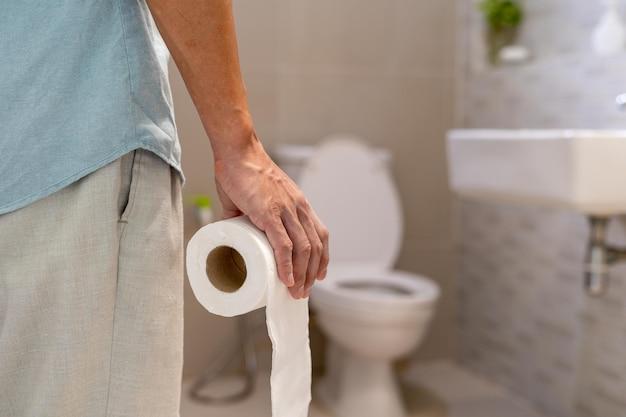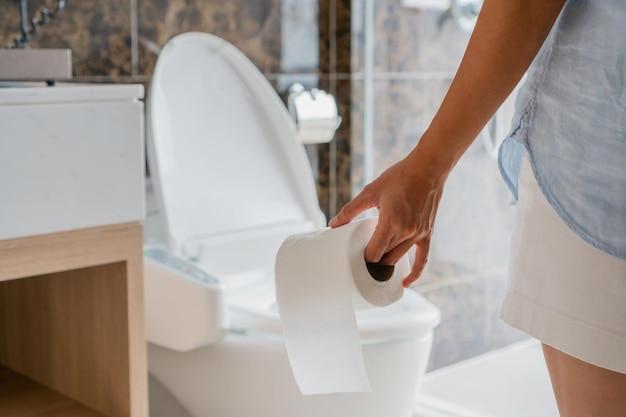The topic of sexually transmitted diseases (STDs) raises many questions and concerns, and one particular query that often comes up is whether STDs can live on toilet paper. With the spread of misinformation and myths, it’s crucial to get accurate information about the transmission of STDs, including chlamydia, gonorrhea, and others. In this blog post, we will dive deeper into this topic to shed light on the truth and provide a clear understanding.
As we explore this topic, we will also touch on related questions such as the possibility of contracting an STD from sheets, the longevity of STDs outside the human body, and whether one can test negative for chlamydia and still have it. It’s important to note that this article’s focus is to provide reliable and up-to-date information to dispel any misconceptions regarding STD transmission through everyday items like toilet paper. So, let’s delve into the facts and separate myth from reality.
Can STDs Spread Through Toilet Paper
Imagine this scenario: you walk into a public restroom, only to find the toilet paper dispenser empty. Panic sets in as you frantically search for a solution. Suddenly, a thought crosses your mind: “Wait a minute, can STDs live on toilet paper?”
The Myth Debunked
Let’s get one thing straight: STDs (sexually transmitted diseases) are primarily spread through sexual contact. Toilet paper is not a medium for transmitting these infections. So, you can take a deep breath and relax knowing that the chances of getting an STD from toilet paper are virtually nonexistent.
The Science Behind It
STD-causing pathogens, such as bacteria and viruses, require specific environments to survive and infect. They need warm, moist conditions, and the ability to enter the body through either direct sexual contact or exposure to bodily fluids. Toilet paper, on the other hand, is just a simple, dry paper product that doesn’t meet the requirements for STD transmission.
Dos and Don’ts in Public Restrooms
While STDs are not a concern when it comes to toilet paper, there are still some best practices to follow in public restrooms to maintain good hygiene:
Do:
- Use a clean public restroom whenever possible.
- Wash your hands with soap and water after using the toilet.
- Use a toilet seat cover or create one using toilet paper if you prefer.
Don’t:
- Share personal items, such as towels or clothing, in public restrooms.
- Touch any surfaces unnecessarily.
- Flush the toilet with your bare hands.
Toilet paper is not a vehicle for the transmission of STDs. So, the next time you find yourself in need of that bathroom necessity, you can rest assured that your choice of toilet paper won’t lead to any unexpected surprises. Remember to focus on practicing good hygiene in public restrooms, and leave the worrying about STDs to the appropriate circumstances. Stay clean, stay safe, and let toilet paper be nothing more than a mundane necessity in your life.
FAQ: Can STDs Live on Toilet Paper
In this FAQ-style subsection, we’ll answer some common questions related to the topic of whether STDs can live on toilet paper. So, let’s dive right in and put your worries to rest!
Can You Get an STD from Kissing
No. Kissing may spread some infections like the common cold or the flu, but STDs don’t typically spread through kissing alone. So, you can pucker up without stressing about STDs in this case!
Can STDs Live on Sheets
Generally, STDs don’t survive for long on surfaces like sheets. They require a warm and moist environment to live, making it unlikely for them to stick around on your bedding. So, no need to strip your sheets every time you have a fleeting worry!
How Long Can an STD Live Outside the Body
The lifespan of an STD outside the human body depends on various factors, but generally, they don’t last very long. Some may survive for a few minutes to a few hours, but they can’t survive for days or weeks. So, don’t let the fear of STDs lurking outside the body haunt you!
Can You Get an Infection from Wiping with Dirty Toilet Paper
While using dirty, unsanitary toilet paper might increase your risk of developing other infections, it’s highly unlikely to contract an STD from it. STDs primarily spread through sexual contact or certain bodily fluids, not through toilet paper. So, no need to fear what lurks on that roll!
Can You Catch Gonorrhea from Sheets
Gonorrhea is mainly transmitted through sexual contact, not through contact with sheets. So, while it’s always a good idea to practice safe habits, you can rest easy knowing that your bed isn’t a potential breeding ground for gonorrhea.
Can STDs Be Transmitted Through Toilet Paper
No, STDs cannot be transmitted through toilet paper. Sexual contact, blood transfusions, and sharing contaminated needles are the common routes of transmission for most STDs. Toilet paper is not an agent of transmission. So, feel free to fulfill your bathroom duties without worrying about STDs lurking on the tissue!
How Long Can STDs Live on a Toilet Seat
STDs typically cannot live for extended periods on hard surfaces like toilet seats. Their survival outside the body is limited, especially on non-porous surfaces. So, that quick bathroom break shouldn’t be a cause for concern!
Can You Get an STD from a Virgin
STDs primarily spread through sexual contact, so if you haven’t engaged in any sexual activities, your chances of contracting an STD are extremely low. However, it’s important to bear in mind that some infections can be passed through other means, such as blood transfusions or needle-sharing. But in the context of virginity, the risk is generally minimal.
Can You Get Chlamydia or Gonorrhea from a Toilet Seat
While theoretically possible, the chances of contracting chlamydia or gonorrhea from a toilet seat are extremely slim. These infections require direct contact with infected genital areas or bodily fluids for transmission. So, unless you’re engaging in some unlikely bathroom behavior, you can relax and sit with ease!
How Long Do STDs Live on Clothes
STDs do not typically survive for long on clothing. The chances of transmission through clothing are incredibly low, as these infections require direct contact or exposure to bodily fluids for transmission. So, feel free to do your laundry without worrying about STD contamination!
How Did I Get Chlamydia If I Didn’t Cheat
Sometimes, STDs like chlamydia can remain dormant for months or even years without showing symptoms. It’s possible to have contracted the infection from a previous partner without knowing it. In rare cases, infection can also occur through non-sexual means, such as contaminated medical equipment or through childbirth. So, while infidelity is one possibility, it’s not the only way chlamydia can enter your life!
Can You Catch Anything from Used Toilet Paper
The risk of catching an infection from used toilet paper is generally low, especially when it comes to STDs. However, using soiled or contaminated toilet paper could potentially lead to other types of infections, like urinary tract infections or gastrointestinal issues. So, it’s always better to keep it clean and opt for fresh toilet paper!
Can Toilet Splash Cause Infection
Toilet splash might not be the most appealing aspect of using the bathroom, but it’s highly unlikely to cause infections, let alone transmit STDs. The germs present in toilet water are usually not dangerous. So, don’t let the occasional splash bring you down – it’s just nature’s way of keeping you on your toes!
What Happens If You Wipe with Dirty Toilet Paper
Wiping with dirty toilet paper may expose you to a range of germs, bacteria, and other potential contaminants. While it’s unlikely to result in an STD, it can increase the risk of developing other infections, especially if the toilet paper has been contaminated by unsanitary conditions. So, for the sake of your health and personal hygiene, use clean, fresh, and sanitary toilet paper!
What Diseases Can You Get from Dirty Toilet Paper
Although the risk is relatively low, using dirty toilet paper can potentially lead to infections such as urinary tract infections (UTIs) or gastrointestinal issues due to exposure to bacteria or other pathogens. However, it’s important to note that STDs are not typically transmitted via toilet paper. So, keep it clean, and you’ll greatly reduce the chances of encountering any unwanted surprises!
Can You Test Negative for Chlamydia and Still Have It
It is possible to receive a false negative test result for chlamydia, particularly if the infection is in its early stages or if the test was performed incorrectly. If you suspect you may have chlamydia, it’s essential to consult a healthcare professional and follow their advice regarding testing and treatment. So, don’t let a negative result give you a false sense of security – better safe than sorry!
Can You Get Chlamydia from Toilet Paper
No, STDs like chlamydia cannot be contracted through contact with toilet paper. Chlamydia is primarily transmitted through sexual activity or exposure to infected genital fluids. Toilet paper is not a known vehicle for transmission. So, no need to worry about catching chlamydia unexpectedly during your bathroom routine!
Should I Get Tested for STDs If I’m a Virgin
If you haven’t engaged in any sexual activity, the risk of contracting an STD is exceptionally low. However, it’s essential to consult with a healthcare professional regarding your specific situation and any concerns you may have. They can provide guidance on whether testing is necessary based on your individual circumstances. So, when in doubt, seek expert advice!
How Can You Get Chlamydia If No One Cheats
It’s essential to remember that chlamydia can be contracted through various means other than infidelity. Infections can occur through sexual contact with an infected but asymptomatic partner or via non-sexual transmission routes, such as contaminated medical equipment. So, while cheating is a possibility, it’s not the only way chlamydia can find its way into your life!
Disclaimer: The information provided here is for educational purposes only and should not be considered as medical advice. Please consult a healthcare professional for personalized guidance and information regarding STDs and your health.
Now that we’ve debunked some common concerns about STDs and toilet paper, you can confidently tackle these FAQs and put your mind at ease. Remember, proper sexual health education and hygiene practices are key to staying safe and worry-free!

